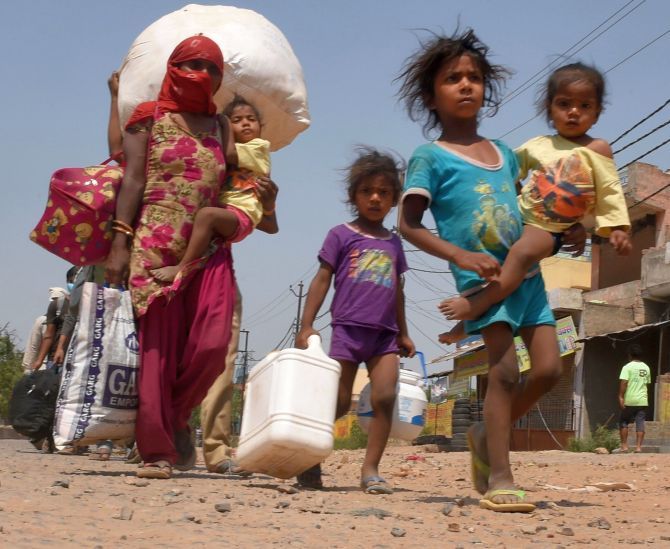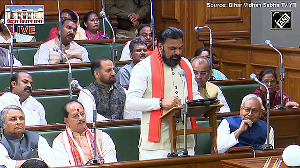'Children need milk. If there is no money, how can one buy it'

An infant crying of thirst or maybe hunger, an exhausted boy asleep over a strolley dragged by his mother, two sisters trying in vain to shield their little brother from the scorching sun with a flimsy 'gamcha'.
As India's migrant crisis continues unstoppably and lakhs walk, hitchhike and scramble for buses and trains to go home, holding on to their few belongings and dependent on charity for food, children are the most vulnerable.
Many children are just wilting.
The hunger and the heat, the stress and the strain of the traumatic journey to their home states are taking a terrible toll, said their parents.
Sitting in an open ground in Kundli, on the Delhi-Haryana border, waiting for a bus to take her to her village in Kanpur in Uttar Pradesh, Neha Devi wondered how to protect her seven-month-old baby.
As the sun beat down mercilessly and the hours passed by with the family no closer to boarding a bus, she tried to calm little Nancy, crying incessantly in the heat.
Neha, just 22 herself, tried feeding her water from a steel glass, and Nancy tried to grab the glass and thirstily took some sips.
But the crying didn't stop.
The young mother tried to cover her with one end of her sari, but the sun was blazing down, the temperature was over 40 degrees Celsius and there was no shade.

Nothing worked.
"She is troubled by the heat," Neha said.
Neha's husband Harishankar, who made a living selling ‘golgappas' in a village near the Haryana town of Sonipat on Delhi border, has been out of work since the lockdown started on March 25.
With their savings drying up, they had no option but to head back.
Not far from them, two sisters and their brother huddled together.
They had one thin towel, ‘gamcha', between them.

Sheetal is nine, Sakshi seven and Nitin three.
The two sisters used the gamcha to cover their brother and themselves, but not very successfully.
The family had been waiting for a bus for 10 hours.
Their parents, Rajput Singh, 35, and Sunita looked on helplessly, worried about their children and how they will endure the difficult journey to their village in Uttar Pradesh's Mau district.
The future of their children is a matter of concern but there was no choice but to go back, they said.
Rajput Singh was a daily wager doing odd jobs in Akbarpur Barota village in Sonipat but with no work and no money to feed his family he has to head homewards.
Both Sheetal and Sakshi study in a government school in Akbarpur Barota but due to the lockdown, they are going back home.

Asked what will happen to their studies, their mother Sunita said, "We will see. We will try coming back once the situation eases."
If the first wave of migration of labourers in the early days of the lockdown was mostly about men returning to their homes, the second wave is about families making the long journey.
Last week, a video showing a woman in Agra dragging a wheeled bag and her son over it as she walked to her home somewhere, was circulated widely, mirroring the struggles of lakhs of migrant families.
Across the expanse of the national capital and its borders, hundreds of such families can be seen waiting or walking, many of them with children.
The availability of food and milk is a constant source of concern.
"Elders can have dal and rice, but what about kids," said Shivshankar Yadav (27), sitting in a little patch of shade under a metro pillar in Anand Vihar on the Delhi-Ghaziabad border.

His wife Aarti (25) and two daughters, Anshi (3) and Priyanshi (2) were with him, the two toddlers showing signs of extreme fatigue.
"Children need milk. If there is no money, how can one buy it," Yadav said.
He worked at a garment factory in Noida and had not been paid since the lockdown began,
So, the family packed their bags and somehow made it from Noida in the hope that they could take a bus or a train to Sultanpur.
Their worries were echoed by Kuldeep Kumar and Ajay Kumar, both fathers in their 20s heading home with their wives and infants to Rae Bareli in Uttar Pradesh.

Both had lost their jobs at the Kundli Industrial Centre and boarded a bus from Sonipat to Uttar Pradesh only to be dropped to a shelter home a few kilometres away because they couldn't manage to get seats.
The shelter home, they said, has barely any facilities.
"We can sustain ourselves. But will our children make it,” said Kuldeep, anxious about the well-being of his 10-month-old daughter. The shelter home, he said, has no milk and only brackish water.
Ajay's son is seven months. And he is concerned too.
Their anxiety that finds echo in distant corners of the country.











 © 2025
© 2025